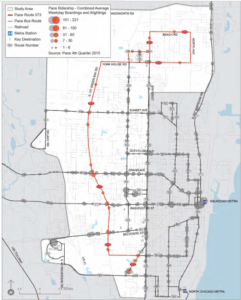Pace bus at Harlem Blue Line Station, Chicago
September 23, 2021
Pace is going electric! Zero emission suburban bus fleet by 2040
New commitment to clean transportation is good for public health across the region, starting in the environmental justice community of Waukegan, IL
In a big step forward for air quality in Chicagoland, suburban bus agency Pace has announced a commitment to transition its fleet to Zero Emission Vehicles by 2040, starting in the environmental justice community of Waukegan, Illinois. This announcement came after ELPC joined with the Climate Reality Project, the Sierra Club, and other environmental and health organizations earlier this month in calling on Pace to reject continued investments in fossil fuel infrastructure. They listened! In the coming years, battery electric buses will be rolling out across the region, using clean and modern transportation technology to connect communities to jobs and opportunity.
Pace’s newly revised strategic plan, “Driving Innovation” includes commitments to stop buying new diesel buses, to invest in electric buses and charging infrastructure, and to prioritize the needs of environmental justice communities who are most burdened by pollution and climate impacts. Pace serves a vast area of northeastern Illinois, including Cook, Lake, Will, Kane, McHenry, and DuPage counties, so this announcement will have broad benefits for the region.
Good for air quality
ELPC and our colleagues have been urging Pace to clean up its fleet for years, because of the known hazards of diesel pollution. Tailpipe emissions include about 40 different pollutants, including particulate matter and nitrogen oxide, which are dangerous to both passengers and surrounding communities, but especially to those with asthma and other chronic respiratory illnesses.
Buses are the bedrock of our region’s public transportation network, since about a quarter of Chicago-area residents don’t have a car. Pace alone has a daily ridership of 127,000+ passengers, including essential workers who have relied on Pace to get to work in healthcare, food, and emergency services throughout the pandemic. Every passenger on the bus means one less car on the road, so buses are important for reducing air pollution and congestion for the wider community. But 800+ new zero-emission buses in the Pace network will have an even greater impact on improving local air quality.
Good for environmental justice
Pace is starting its shift to electric buses in the working-class community of Waukegan, Illinois, which has historically faced a disproportionate burden of industrial air pollution. In addition to a diesel bus depot and an ethylene oxide facility to the west, Waukegan’s municipal beach and marina east of downtown are directly adjacent to four superfund sites, an aerospace production facility, and a coal plant. Nearly 90% of the residents within a mile of these facilities are people of color, 55% low-income, with historically high asthma rates in Waukegan at about 32% compared to the national average of 10%.
Pace will purchase six electric buses for Waukegan in 2022, followed by 52 more buses by 2026, along with investing millions in charging infrastructure. By targeting Waukegan for investments in cleaner transportation, Pace will be able to make a difference quickly for some of the people who need it most.
Good for climate action
Public transportation is a key tool in the fight against climate change, since it is much more energy efficient to travel collectively than in individual vehicles. Transportation is currently the largest source of the pollution driving the climate crisis, primarily from personal fossil-fuel powered cars and trucks. According to Pace, the average transit rider consumes half of the oil of an automobile rider, and as Pace shifts away from fossil fuels the benefits will only increase. Renewable energy is becoming a larger proportion of the electric grid every year, so soon electric buses powered by wind and solar will become the norm, helping people get where they’re going without creating carbon pollution.
Pace’s new commitment to zero emissions vehicles is a good step for clean air and climate action in the Midwest. We are thrilled that the leadership at Pace heard community feedback and responded with a smart plan with real deadlines. ELPC will continue to hold Pace accountable to these commitments as part of our broader fight for clean air and accessible transportation across the region.



